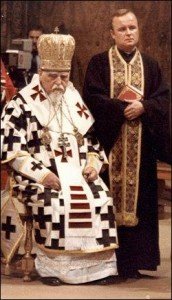 Patriarch Joseph Slipyj, of blessed memory, wrote: The Liturgical cycle of the Church is very rich. It guides us through the whole year, continuously placing before our eyes the of the life, passion, death and resurrection of Christ, the grandeur of the Divine Motherhood and powerful intercession of the most Holy Virgin Mary, and the lives of holy men and women who, by their heroic lives, give us further insight into how to live life. The Patriarch further wrote: The seasons of fast help us to exercise more self-control and better prepare us for a sacramental encounter with Christ.
Patriarch Joseph Slipyj, of blessed memory, wrote: The Liturgical cycle of the Church is very rich. It guides us through the whole year, continuously placing before our eyes the of the life, passion, death and resurrection of Christ, the grandeur of the Divine Motherhood and powerful intercession of the most Holy Virgin Mary, and the lives of holy men and women who, by their heroic lives, give us further insight into how to live life. The Patriarch further wrote: The seasons of fast help us to exercise more self-control and better prepare us for a sacramental encounter with Christ.
It is evident that our Church Year resembles a great spiritual book that teaches us in a practical manner how to praise, love and serve God and thus save our souls. It speaks to us of the great love and mercy of God towards us. It predisposes us to prayer, sacrifice and penance.
The Liturgical Year is indeed important for our spiritual development for several reasons. First, it reminds us that Christ is living and still active in our world and lives. For us the festivals or holy days of the Year are not meant to be simply commemorations of past historical events. They are, rather, opportunities for us to participate in these life-giving events. Since there is truly no time in the spiritual dimension of the universe, all of the events that we celebrate are taking place right now. The people involved in the events we celebrate are not dead persons but, rather, people we know to be alive in God’s Kingdom – the next dimension of life.
The Church Year, then, is a reminder to us that Christ is still actively working in our world and that we become His extension into history and time.
The Church Year also presents the Good News in practice and helps us to see how we should live right now in order to make God’s Kingdom real.
It is important to note that our Church Year, which begins at a different time than that of the Western Church, also has its own calendar of saints and feast days. Some holy days fall on the same dates. Others do not. We have our own unique calendar of saints. We also have our own unique lectionary, the book of appointed readings for each day of the year. We have our own Typicon, the book of prescribed ways and times for conducting feasts and their particular services.
These differences in liturgical practice, as you can well appreciate, greatly influence the spirituality and practices of our Church. While there are parishes in our Church that employ typical Western liturgical practices (e.g., Stations of the Cross) these services are not traditionally a part of our liturgical practice because they express a different spirituality.
Authenticity is the goal!
